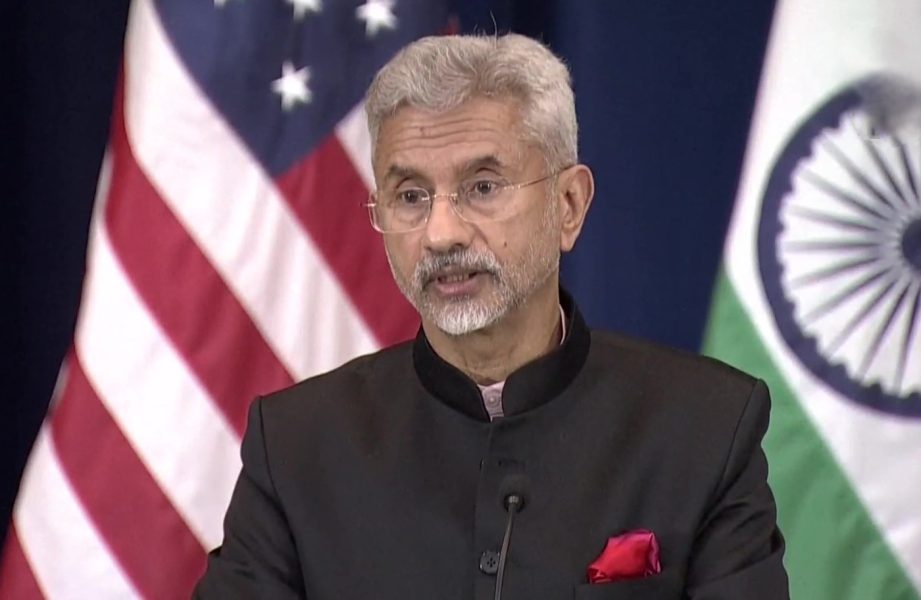
Jaishankar: Why do foreign dailies use terms like 'Hindu nationalist' only for India?

India’s foreign minister S Jaishankar took a dig at foreign newspapers, accusing them of using phrases like “Hindu nationalist government” for the BJP-led Indian government and questioning why they didn’t use terms like “Christian nationalist” for American or European governments.
“If you read foreign newspapers, they use words like Hindu nationalist government. In America or Europe, they won’t say Christian nationalist…these adjectives are reserved for us. They don’t understand that this country is ready to do more with the world and not less with the world,” he said.
Jaishankar’s statement comes in the midst of a raging controversy over a BBC series on the alleged involvement of Prime Minister Narendra Modi in the Gujarat riots. Calling the documentary a propagandist piece, the Indian government has banned it on several platforms.
The Minister for External Affairs was speaking at the release of the Marathi translation (Bharat Marg) of his Englsih book The India Way: Strategies for an Uncertain World.
Dig at Rahul on China
Speaking about India’s relations with China, Jaishankar took a swipe at Congress leader Rahul Gandhi by stating that some people deliberately spread wrong news about the China and speak as if the issue happened recently even though in reality it dates back to 1962.
“If you want to ask why they have no confidence, why are they misleading people, why they spread the wrong khabar (news) about China? How can I answer these questions? Because I know they are also doing politics. Sometimes they deliberately spread such news that they know is not true,” Jaishankar said.
“Sometimes, they talk about some land, which was taken by China in 1962. But they will not tell you the truth. They will give you the impression that this thing happened yesterday,” he said without taking names.
Rahul in last September said Prime Minister Narendra Modi has given “100 square kilometres of Indian territory” to China “without a fight,” and asked the government how it will be retrieved.
Jaishankar also said sometimes some people say there is “soch me kami” (lack of understanding) in him but in that case, he will approach the military leadership, Army, or Intelligence. “I will not call the Chinese ambassador and seek information,” he said.
Interestingly, in 2017, when India and China were locked in a standoff on the border area abutting Bhutan, the Congress said Rahul had met the ambassadors of the two neighbouring countries.
The EAM said China is India’s only neighbour which is a global power and may become a superpower in the years to come.
On India’s view regarding current developments in Pakistan and what would be the implications of New Delhi’s decisions regarding the IWT, Jaishankar said it would not be appropriate for him to comment in public about the happenings in that country.
On Islamabad’s “intransigence” on Indus Water treaty
“In this (Indus Water) treaty, there are commissioners from both countries (India and Pakistan). It is a technical matter and Indus commissioners will talk to each other and after that, we can see what would be the next step,” said Jaishankar.
His remarks came against the backdrop of India, according to sources, issuing a notice to Pakistan for the first time, seeking a review and modification of the IWT, in view of Islamabad’s “intransigence” to comply with the dispute redressal mechanism of the pact that was signed more than six decades ago for matters relating to cross-border rivers.
Responding to a query about the failure of a rogue nation (read Pakistan) which is a nuclear power and also an unfortunate neighbour, the Union minister said, “like Pandavas could not choose their relatives, India also cannot choose its neighbours”.
He also said countries in the south and the developing world are feeling the pain and India must stand for them while most of the developed nations are looking only at their concerns.
The EAM said his book aims to get people to associate with the nation’s foreign policy and not just listen to the “mandarins” (a term generally used for powerful bureaucrats).
Jaishankar also touched on the topic of terrorism, saying no nation has suffered from the menace as much as India due to the “neighbour we have”, an apparent reference to Pakistan.
Underlining India’s robust stand against terrorism now, he cited the surgical strikes post attacks in Pulwama and Uri and called them “decisive action.
(With inputs from agencies)


